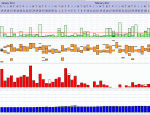So he could stop breathing for 9 seconds, take a breath, stop breathing for 9 seconds, take a breath.... there would be no apneas flagged.idamtnboy wrote:That's the official definition. It could have been 5 secs, 8 secs, or whatever. The general consensus is that 10 seconds was chosen as that is the threshold that clinical data shows to be the point where there is a measurable or significant adverse effect on the body. The generic definition of apnea is a cessation of breathing, but what is cessation? The time span of one normal breath, or two breaths, or ..... You get the point I'm sure.Mary Z wrote:Lizistired, I'm confused by what you said. I thought an apnea was the cessation of breathing for 10 seconds or more. Where am I going wrong here? A hypopnea is reduction in airflow of 50 % for greater than 10 seconds. Thanks.
Just like if I have an AI of 4.0 in 10 hours of sleep. That's acceptable. But I know from my sleep studies that all of my apneas were in REM. So if I had 40 apneas for the night and they were all in two 20 minute fragmented segments of REM, an AI of 4.0 doesn't sound so good to me anymore.
The AI also doesn't tell me the duration of the apneas. They could be 10 second apneas, or 47 second apneas like Alex had.
He must feel 1000% better than before. I just want to point out some things he might want to consider when looking at his data.
(I relinked the image here since the other one is gone.)














